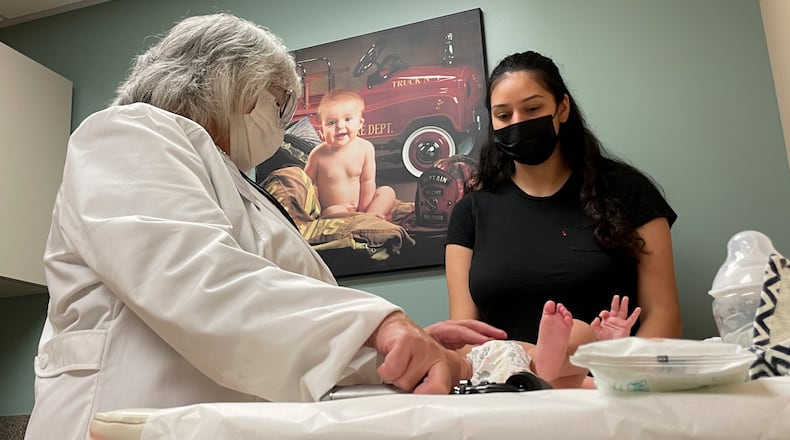“More than half of infants less than one year of age who get the disease must be hospitalized and in rare cases, pertussis can be deadly,” said Dr. Becky Thomas, Public Health’s medical director.
Infants with whooping cough may not cough, but they may may gag and gasp instead. Infants may also experience a symptom known as “apnea,” which is a pause in a child’s breathing pattern.
Earlier this month, this news organization reported 27 cases of whooping cough, a “highly contagious” bacterial disease, in Montgomery County, which was more than double of last year’s 13 reported cases. Prior to the pandemic, there were 100 cases reported in 2019 and 86 in 2018.
The ages of those cases range from 4 months old to 70 years old, Public Health said.
“It’s a rapid rise of cases there in the last three months,” said Dan Suffoletto, Public Health’s public information manager.
Surrounding counties are seeing low case numbers, with five cases reported in Clark County this year, according to the Clark County Combined Health District. Reported pertussis cases in Miami County totaled five through August, according to Nate Bednar, community services director. Four cases have been confirmed this year in Greene County.
There are no current outbreaks of whooping cough in Warren County. There was only one confirmed case in Warren County this year, which was in February, according to the Warren County Health District.
Butler County is also not experiencing any outbreaks of whooping cough, only two cases have been reported this year.
“We are sitting at much lower than our pre-pandemic five-year average,” said Erik Balster, Butler County health commissioner. “However, we are monitoring the situation and making our health care partners and school partners aware of the increase in surrounding counties and what to look for.”
Public Health - Dayton and Montgomery County is reminding parents to keep their kids up to date with their vaccinations. Vaccination is the best protection against whooping cough, Suffoletto said.
Immunity, whether from getting the vaccine or from having the disease, wears off over time, leaving previously immune children at risk again by adolescence, according to Public Health. People caring for a new baby may also need a pertussis booster shot to provide protection for infants who haven’t had a chance to get the full series of vaccinations yet.
There are pertussis vaccines for infants, children, adolescents, and adults, Public Health said. The vaccine is called DTaP is for infants and young children. The pertussis booster vaccine for adolescents and adults is called Tdap. Both vaccines provide protection against tetanus, diphtheria, and pertussis diseases.
The COVID-19 pandemic disrupted routine childhood vaccination schedules for millions of children world wide, said UNICEF and the World Health Organization, but 2022 saw diptheria-pertussis-tetanus (DTP) immunization coverage almost recovered to 2019 levels. The number of children missing out on any vaccination globally improved from 18.1 million in 2021 to 14.3 million in 2022, nearly back to pre-pandemic 2019 level with 12.9 million, the World Health Organization said.
Who should be vaccinated?
- Children: Infants need a series of four doses of DTaP given at 2, 4, and 6 months, and between 15-18 months of age. A fifth dose is required between ages 4 and 6 years, before starting kindergarten.
- Adolescents: Adolescents receive a booster dose at 11-12 years of age. The state of Ohio requires seventh graders receive the Tdap booster.
- Pregnant women: Pregnant women should get vaccinated against pertussis once during each pregnancy. This vaccine provides protection to newborn babies before they are old enough to receive vaccine themselves.
- Adults: Any adult who has never received a dose of Tdap should get one.
To schedule an appointment to be vaccinated, contact your health care provider or call the Public Health Clinic at 937-225-4550.


